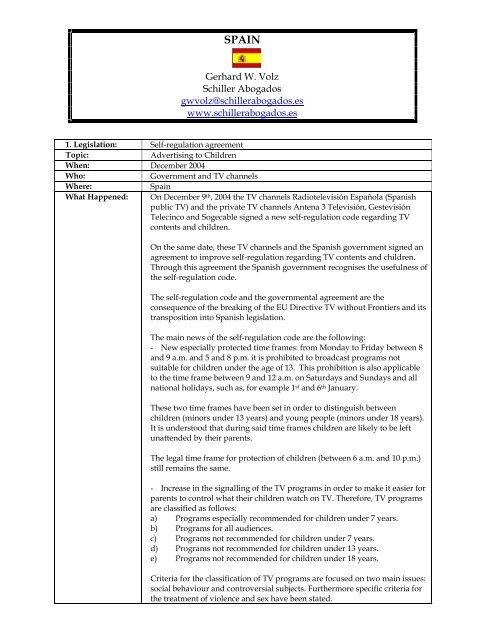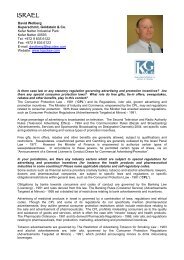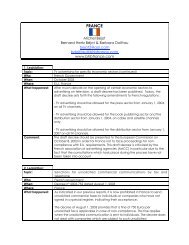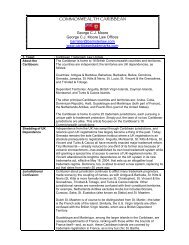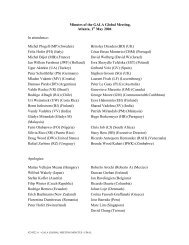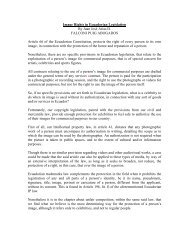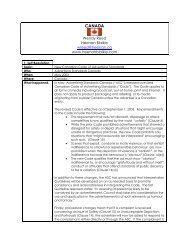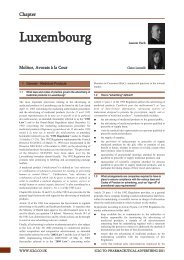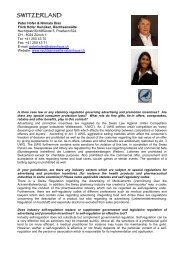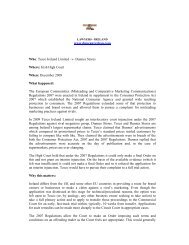list of contributors - GALA
list of contributors - GALA
list of contributors - GALA
Create successful ePaper yourself
Turn your PDF publications into a flip-book with our unique Google optimized e-Paper software.
SPAIN<br />
Gerhard W. Volz<br />
Schiller Abogados<br />
gwvolz@schillerabogados.es<br />
www.schillerabogados.es<br />
1. Legislation: Self-regulation agreement<br />
Topic: Advertising to Children<br />
When: December 2004<br />
Who: Government and TV channels<br />
Where: Spain<br />
What Happened: On December 9 th , 2004 the TV channels Radiotelevisión Española (Spanish<br />
public TV) and the private TV channels Antena 3 Televisión, Gestevisión<br />
Telecinco and Sogecable signed a new self-regulation code regarding TV<br />
contents and children.<br />
On the same date, these TV channels and the Spanish government signed an<br />
agreement to improve self-regulation regarding TV contents and children.<br />
Through this agreement the Spanish government recognises the usefulness <strong>of</strong><br />
the self-regulation code.<br />
The self-regulation code and the governmental agreement are the<br />
consequence <strong>of</strong> the breaking <strong>of</strong> the EU Directive TV without Frontiers and its<br />
transposition into Spanish legislation.<br />
The main news <strong>of</strong> the self-regulation code are the following:<br />
- New especially protected time frames: from Monday to Friday between 8<br />
and 9 a.m. and 5 and 8 p.m. it is prohibited to broadcast programs not<br />
suitable for children under the age <strong>of</strong> 13. This prohibition is also applicable<br />
to the time frame between 9 and 12 a.m. on Saturdays and Sundays and all<br />
national holidays, such as, for example 1 st and 6 th January.<br />
These two time frames have been set in order to distinguish between<br />
children (minors under 13 years) and young people (minors under 18 years).<br />
It is understood that during said time frames children are likely to be left<br />
unattended by their parents.<br />
The legal time frame for protection <strong>of</strong> children (between 6 a.m. and 10 p.m.)<br />
still remains the same.<br />
- Increase in the signalling <strong>of</strong> the TV programs in order to make it easier for<br />
parents to control what their children watch on TV. Therefore, TV programs<br />
are classified as follows:<br />
a) Programs especially recommended for children under 7 years.<br />
b) Programs for all audiences.<br />
c) Programs not recommended for children under 7 years.<br />
d) Programs not recommended for children under 13 years.<br />
e) Programs not recommended for children under 18 years.<br />
Criteria for the classification <strong>of</strong> TV programs are focused on two main issues:<br />
social behaviour and controversial subjects. Furthermore specific criteria for<br />
the treatment <strong>of</strong> violence and sex have been stated.


